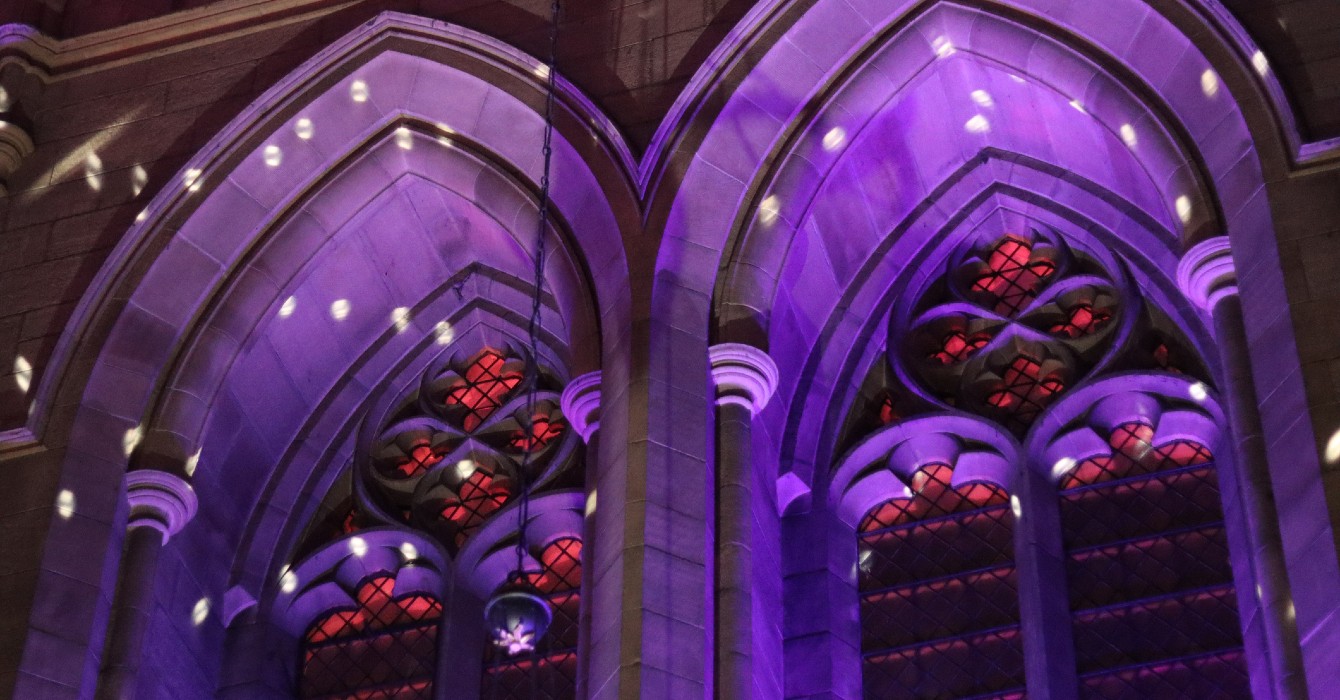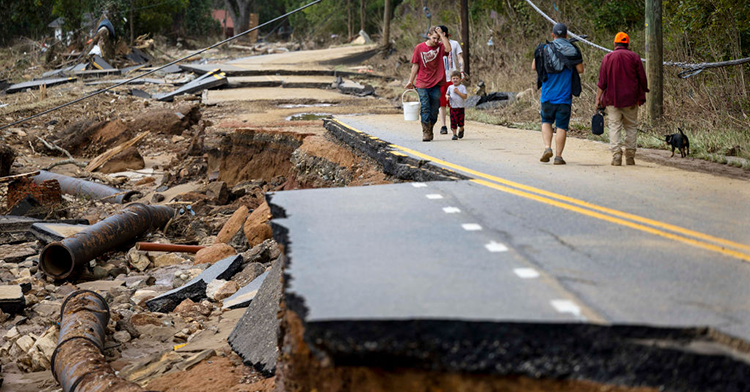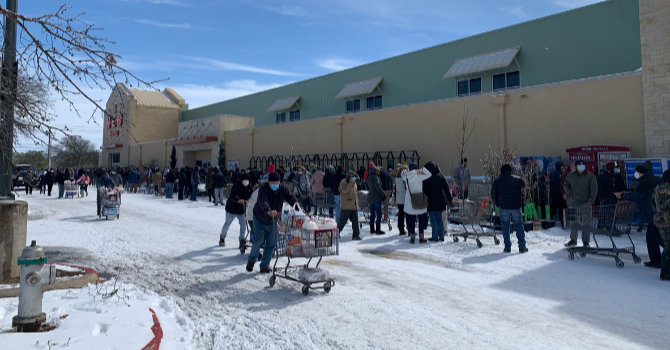The Rev. Holly Cobb McKim arrived at her new appointment in Spruce Pine, North Carolina, July 8, 2024. She quickly settled into the congregation and worship. Within a few weeks, she could call folks by name and began to learn who was who in the congregation.
She quickly fell in love with the congregation at Spruce Pine United Methodist Church: the ministries, the mission and the breathtakingly beautiful mountain setting.
Less than three months later, she awoke one morning, stunned at the destruction she could see from her yard.
“Devastation surrounded us, in all directions,” she said. “Not just floods: walls of water 50 feet high roaring through valleys, mountain landslides taking out everything in the path.”
Whole communities were devastated by Hurricane Helene. The power grid was down, water and sewer treatment plants were destroyed, and cell towers were no match for the hurricane-force winds, rain and tornadoes.
To get a sense of the staggering scale, consider that 29 of the 44 counties in the Western North Carolina Conference of the UMC, along with the Eastern Band of the Cherokee Indians, were in a state of emergency.
Over 100 people died, dozens went missing, and there were nearly $60 billion in damage. More than 275,000 people would apply for individual assistance. Infrastructure was damaged or destroyed, including 1,000 bridges and 6,000 miles of roads.
Like other pastors and congregations across the region, McKim and her congregation jumped in to help. Spruce Pine UMC hosted weekly Early Response Teams and served as a hub for supplies and resources before transitioning to long-term work as a UMC Disaster Recovery Center.
As the strenuous work of recovery began, we at the conference were aware that our spiritual leaders were themselves traumatized by the natural disaster. They were shepherding, offering leadership and solace, at a time when their own physical, psychological and spiritual resources were deeply diminished.

Many clergy in the affected areas, and many whose families of origin were in these mountain communities, were in crisis. As a connectional church, our response was first to be present and to listen and then to provide support for the long-term recovery — of our people as well as the communities they served.
The conference collaborated with other United Methodist-affiliated organizations to create spaces dedicated to healing and renewal. Clergy impacted by Hurricane Helene were invited to participate in a clergy respite and recovery retreat held in four locations in western and central North Carolina February through May 2025.
The retreats focused on physical and mental well-being. Participants had a chance to practice tai chi, get acupuncture treatments, ride horses and receive spiritual direction, among other offerings. During each four-day retreat, they reflected on trauma and vocational clarity and had time to develop a strategic plan for the year ahead.
Rest, rejuvenation, deep listening and meaningful fellowship; our pastors desperately needed this.
Recovery work is hard and unrelenting: organizing supplies, digging out mud, carrying boxes, letting people cry on one’s shoulder. McKim, for example, found that taking a break helped her get back into spiritual practices of meditation and devotion, prayer walking and journaling.
The Rev. Ashley Crowder Stanley, who coordinated the retreat at Lake Junaluska, said that the 23 participants arrived with “quiet, pensive, exhausted spirits.” As they left, some told her that those days together had been a turning point in their healing; others planned to seek out therapy or spiritual direction in the months ahead.
The Rev. Ben Carson of FaithBridge UMC in Blowing Rock experienced both personal injury and congregational devastation; he was swept underwater into a culvert during the storm and spit out downstream, something he describes as “going to Nineveh.” The retreat, he said, offered a chance to reflect on resilience.
“We defined resilience as ‘struggling well in the midst of adversity,’” he said. “This has become important to me personally and to my ministry, as we realize that recovering from Helene is not going to be a quick fix but rather struggling well together as we seek to put all the pieces back together.”
The site facilitators met several times to imagine what the retreats might include. They wanted the retreats to have a consistent framework and focus while allowing different locations to leverage their settings, which ranged from a lakeside retreat to a college town.
Clergy were invited and encouraged to participate. As the conference bishop, Ken wanted to be present but also to allow space for free expression, so he attended one day of three of the retreats and participated fully in the fourth.
They were funded by the Western North Carolina Conference churches, The Duke Endowment, the Parish Ministry Fund and the host sites.
Suzanne Schilling, executive director at one of the host sites, the Davidson Centre for the Professions, said that once they arrived, the clergy realized just how much they needed the respite. They left with renewed energy and a game plan to take forward, she said.
This was particularly important because the Helene experience was not in the past, she said.
For Carson, the respite week better equipped him to be incarnational in his ministry focus, especially as it relates to trauma.
“I now have more skills to be ‘trauma aware’ and a better capacity to be with folks in the midst of life’s struggles,” he said.
Crises remind us that the church is at its best when we live as the body of Christ, extending healing and hope to those in need, including pastoral leaders. As the director of ministerial services, with responsibility for resourcing and encouraging leaders, Kim regularly reflects on what clergy and ministry professionals most need — and how our conference can faithfully respond.
One theme is clear: There remains a deep need for healing from trauma and for spaces that foster spiritual renewal. This is true not only in the wake of a region-wide disaster but in less widespread but equally devastating situations as well.
McKim, the pastor in Spruce Pine, said she found that the retreat was “a reset, a rest, a way to remember but not dwell and a way to recover a sense of ministry other than Helene recovery.”
Spruce Pine UMC continues to aid in recovery into the second year after the storm by hosting staff from WNCC Disaster Ministries and offering space for weekly volunteer teams. They also are getting ready to provide emergency heat for people during the frigid mountain winter.
“The respite week was the stop and reboot I needed but did not know I needed,” she said. “I am just one person in God’s kingdom repair and building work; I have a beautiful congregation and community also in the same work.”


































